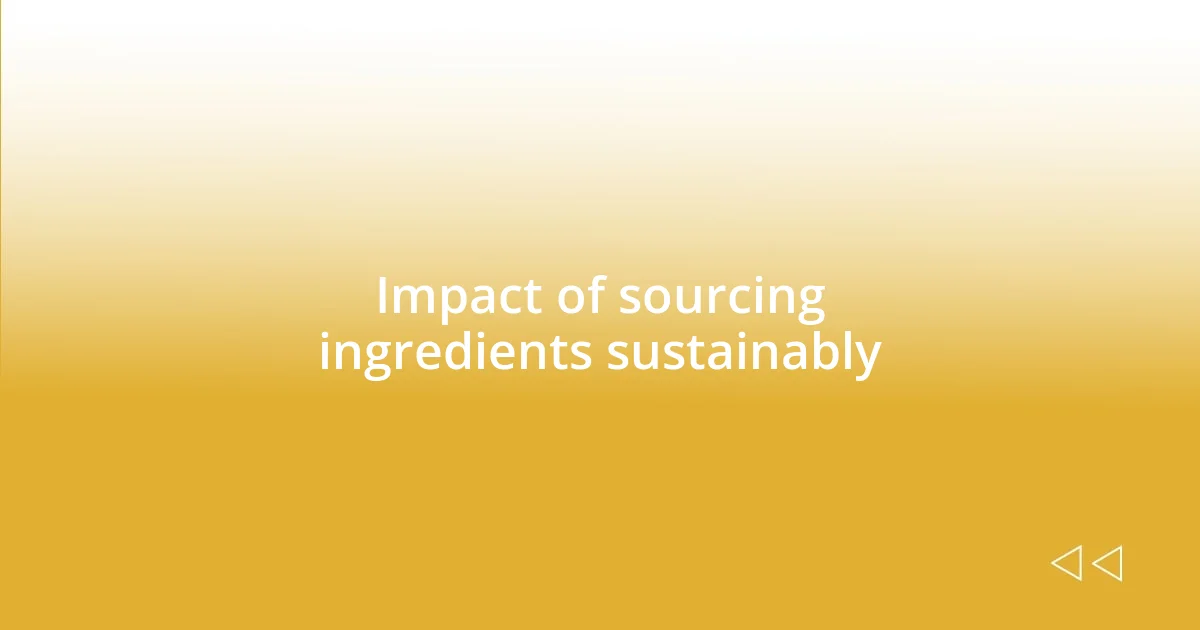Key takeaways:
- Sustainable practices in fast food enhance brand image and customer loyalty while benefiting the environment and local communities.
- Major chains are implementing key initiatives, such as sourcing sustainable ingredients and reducing plastic waste, reflecting a growing responsibility towards sustainability.
- Consumer awareness and engagement, particularly through social media, play a crucial role in driving change and encouraging fast-food brands to prioritize eco-friendly practices.

Importance of sustainable practices
Sustainable practices in fast food aren’t just a trend; they’re becoming an essential part of how we think about food and its impact on our planet. I remember sitting in a local fast-food joint, surrounded by wrappers and plastic, and wondering if this is how I want my meal’s legacy to be. When companies adopt sustainable practices, they don’t just reduce waste; they create a ripple effect, inspiring both consumers and other businesses to rethink their own practices.
These efforts benefit not only the environment but also the fast-food chains themselves, enhancing their brand image and customer loyalty. I can’t help but feel a sense of connection when I choose a restaurant that prioritizes sustainability. It raises an important question: don’t we all want to support businesses that care about our future? When fast food chains commit to sustainability, they engage with us on a deeper level, creating a shared vision for the planet.
Moreover, sustainability in fast food can dramatically impact local communities. I’ve seen firsthand how a restaurant’s focus on sourcing ingredients locally can drive economic growth in the surrounding area. It’s more than just food; it’s about fostering a sense of community and responsibility. Isn’t it uplifting to know that our dining choices can support local farmers and help reduce carbon footprints? Embracing sustainable practices is a win-win for everyone involved.

Key initiatives by major chains
Many major fast-food chains have kicked off significant initiatives aimed at boosting sustainability. For me, it’s refreshing to see companies take genuine steps towards a greener future. For instance, I remember when McDonald’s introduced their commitment to sourcing sustainable beef. It touched me to know they were acknowledging the environmental impact of livestock. It prompted me to think about the journey my meal takes from farm to table, and how important it is for that journey to be responsible.
Here are some noteworthy initiatives from leading chains:
- Burger King: Transitioning to a more plant-based menu, including the popular Impossible Whopper, to reduce meat consumption.
- Starbucks: Committing to eliminate plastic straws and invest in reusable cups, which resonates with those of us who are passionate about reducing single-use plastics.
- Chipotle: Focusing on more sustainable agriculture practices by sourcing organic and locally grown produce, making me feel more connected to my meal’s origins.
- Wendy’s: Pledging to use cage-free eggs in their supply chain by 2025, which represents a shift towards more humane animal welfare practices.
- Taco Bell: Recyclable packaging initiatives and waste reduction programs that integrate sustainability into their business model, making dining guilt-free.
These commitments from familiar brands reflect a growing awareness and responsibility that resonates with many diners, including myself. Seeing these initiatives gives me hope; it’s a reminder that every choice we make—especially in the food we enjoy—can be part of a larger movement towards a healthier planet.

Impact of sourcing ingredients sustainably
Sourcing ingredients sustainably has a profound impact on the environment. I remember visiting a local farm where the produce for a nearby restaurant is grown. It felt so rewarding knowing that my meal was not only fresh but also supported eco-friendly farming practices. When fast-food chains make the choice to source their ingredients sustainably, they significantly reduce their carbon footprint, which is a big win for the planet. These efforts can help restore ecosystems and promote biodiversity, highlighting the importance of supporting practices that prioritize the earth.
Additionally, the economic implications of sustainable sourcing are noteworthy. I’ve seen how restaurants that prioritize local suppliers often create jobs in their communities. These partnerships not only foster a sense of local pride, but they also ensure that the ingredients are fresher and support the local economy. When I choose to eat at a place that values sustainability, I feel like I’m contributing to something larger—empowering local farmers while enjoying delicious food.
Finally, sustainable sourcing often leads to a greater transparency in food production. It’s heartening to look at a menu and see the origins of my meal clearly stated. I recall dining at a place that openly sourced its chicken from a local farm known for humane practices. Knowing where my food comes from instills confidence in my choices. It’s a simple but crucial element in building trust between consumers and brands, and it promotes a culture of accountability that benefits us all.
| Aspect | Impact |
|---|---|
| Environmental | Reduces carbon footprint and promotes biodiversity |
| Economic | Supports local job creation and farmers |
| Transparency | Builds trust and accountability in food sourcing |

Consumer awareness and engagement
It’s fascinating how consumer awareness and engagement are driving changes in the fast-food industry. I think back to a time when I shared a meal with friends, and we debated the impact of our choices on the environment. It was enlightening to realize how much power we have as consumers. A simple conversation can spark curiosity and lead to deeper understanding about the sourcing and sustainability practices of our favorite chains.
I often find myself exploring how engaged consumers have become with these initiatives. Social media plays a huge role in this shift, making it easier for us to hold brands accountable. I once scrolled through Instagram and stumbled upon a post from a fast-food chain highlighting their sustainable practices. The likes and comments were overwhelmingly positive, which made me wonder: Could our voices really influence the sustainability direction of these major players? In my experience, the answer is a resounding yes. When we actively discuss and promote sustainable options, we contribute to a larger narrative that encourages companies to prioritize these efforts.
Moreover, I can’t help but express how fulfilling it is when I see fast-food establishments engaging with their customers about sustainability. Just last week, I visited a café that hosted an open forum where patrons could share thoughts on their eco-friendly initiatives. It created a sense of community and made me feel like my opinion mattered. Have you ever participated in such conversations? It’s truly eye-opening to realize that our engagement can inspire change—not just within industries, but within ourselves. This connection emphasizes how our collective voice can shape a healthier, more sustainable future for all.















